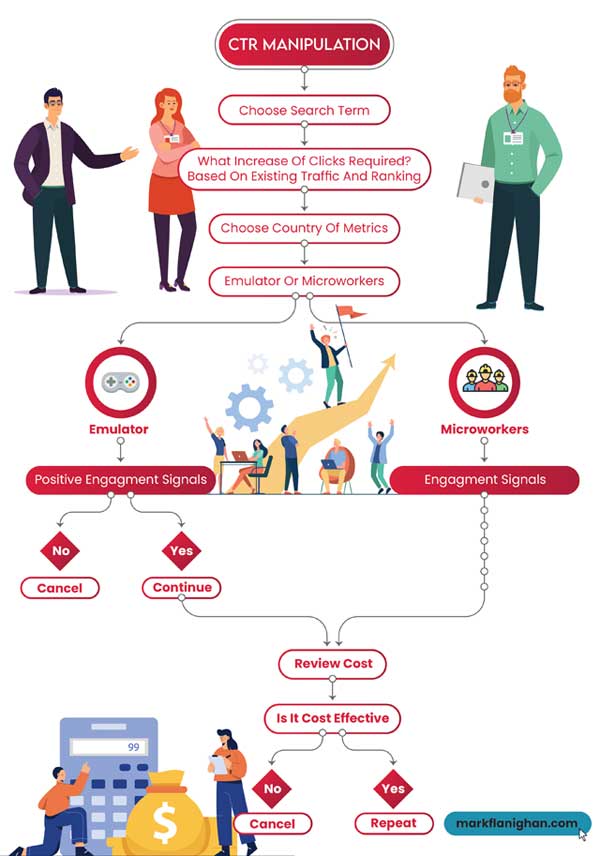LinkDaddy CTR Manipulation: Professional Providers to Boost Your Click-Through Rates
Discovering the Connection In Between CTR Adjustment Services and User Actions
In the realm of digital advertising, the impact of click-through rate (CTR) adjustment solutions on individual actions remains a complicated and appealing topic. As on the internet systems increasingly count on CTR metrics to gauge the success of material, items, and services, comprehending exactly how these adjusted rates impact customer involvement and decision-making procedures is critical. The interaction in between CTR adjustment and individual actions elevates inquiries regarding authenticity, trustworthiness, and the ethical implications of such practices. By dissecting the elaborate partnership between CTR adjustment solutions and customer actions, intriguing insights arise that may reshape our understanding of electronic advertising and marketing methods and their effects on customers.
Influence of CTR Control on Habits
Assessing the influence of Click-Through Rate (CTR) manipulation on customer habits reveals vital insights into the dynamics of online engagement. CTR control includes unnaturally pumping up the variety of click a certain link or ad to deceive customers and search engines. This method can result in an altered perception of a webpage's appeal or significance, inevitably affecting individual actions.

In addition, CTR adjustment can skew the information made use of by algorithms to individualize customer experiences. This can lead to users being offered web content that does not align with their preferences or rate of interests, eventually leading to a decline in user complete satisfaction and interaction. Comprehending the influence of CTR control on individual actions is important for maintaining transparency and rely on on the internet interactions.
User Interaction With Controlled CTR
Individual involvement with manipulated CTR data frequently leads to manipulated assumptions of on-line material popularity and relevance. When users communicate with web content based upon synthetically filled with air Click-Through Fees (CTR), they might think that particular information, products, or services are more popular or reliable than they really are. This can cause individuals choosing based upon deceptive information, bring about potentially undesirable end results.
Interaction metrics like likes, shares, comments, and time invested on a page are frequently affected by CTR manipulation. Individuals might be a lot more inclined to engage with web content that shows up to have greater interaction rates, additionally bolstering the cycle of manipulated assumptions. Because of this, material creators and marketers might prioritize generating content that produces high CTR read more instead of focusing on creating truly valuable and relevant material.

Psychological Impacts of CTR Control

Furthermore, the psychological get redirected here impacts of CTR adjustment can likewise materialize in transformed decision-making processes. Users may be more likely to click on web content entirely based upon its perceived appeal, instead of its real value or significance to their needs. This behavior shift can result in a surface interaction with online web content, where individuals might forget high-quality however much less popular offerings for those with synthetically enhanced CTRs.
Essentially, the psychological ramifications of CTR manipulation highlight the relevance of maintaining transparency and authenticity in online interactions to promote real individual interaction and trust fund.
Honest Factors To Consider in CTR Manipulation
CTR control increases concerns concerning deceiving users, distorting information analytics, and endangering the reputation of on-line content. By artificially inflating CTR, users may be misdirected right into clicking on links or advertisements they would certainly not have actually selected otherwise, leading to an insincere online experience.
One more honest facet to contemplate is the fairness of manipulating CTR to gain an unreasonable advantage over competitors. Engaging in such methods not just goes against concepts of fair play yet additionally threatens the trust fund that customers put in on-line platforms. It is vital for companies and electronic marketing experts to maintain honest criteria in their techniques to ensure transparency, reliability, and long-lasting sustainability in the on-line environment.
Effects for Digital Marketing
CTR manipulation can lead to manipulated information analytics, misleading marketing experts right into thinking that their campaigns are doing far better than they actually are. When users recognize that CTRs have actually been controlled, it can deteriorate trust fund in the brand name, leading to lasting unfavorable consequences for client commitment and brand online reputation.
Additionally, the use of CTR adjustment services can produce an unjust competitive landscape, where business that participate in such techniques obtain a fabricated advantage over those that stick to ethical marketing standards. This can stifle technology and creative thinking in digital marketing, as success comes to be more about manipulation tactics than delivering real worth to customers. Ultimately, the effects of CTR control for digital marketing expand beyond temporary gains, affecting the total sustainability and credibility of advertising efforts in the digital world.
Conclusion
To conclude, the partnership in between CTR control solutions and individual behavior is complex and multifaceted. The effect of CTR adjustment on habits, individual involvement with manipulated CTR, psychological results, moral factors to consider, and ramifications for digital marketing all play a duty fit this partnership. Recognizing these dynamics is vital for marketers and researchers alike in order to browse the moral effects and make best use of the efficiency of their digital advertising strategies.